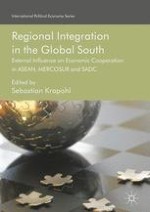2017 | OriginalPaper | Chapter
2. Two Logics of Regional Integration and the Games Regional Actors Play
A Theoretical Framework for the Analysis of Regional Economic Cooperation and Defection
Author : Sebastian Krapohl
Published in: Regional Integration in the Global South
Publisher: Springer International Publishing
Activate our intelligent search to find suitable subject content or patents.
Select sections of text to find matching patents with Artificial Intelligence. powered by
Select sections of text to find additional relevant content using AI-assisted search. powered by
